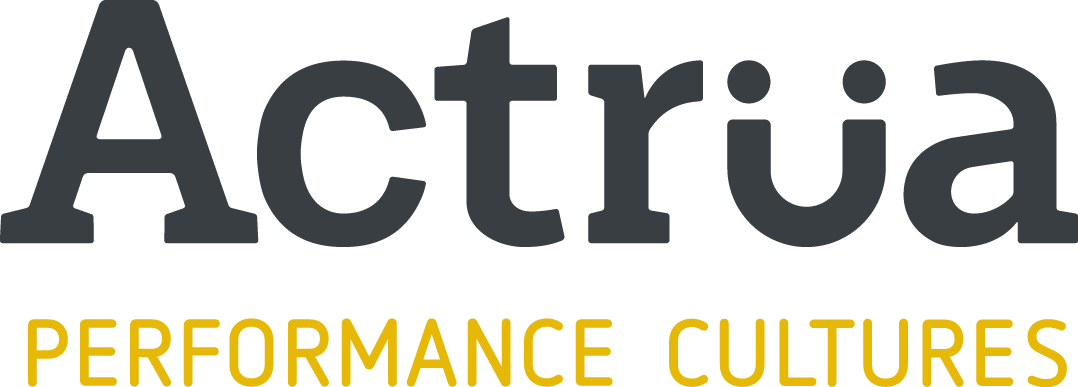When we were recently approached by a Melbourne based production company to film an episode for Foxtel’s Industry Leaders program, we felt it was a great opportunity to share the story about the culture that sits behind the Actrua brand. We hope that in sharing our story, it provides insight and inspiration to not only aspiring business leaders, but also to our clients, our team, our family and friends.
Actrua partners with our clients to create cultures of performance and we live by the philosophy of “Practice what we Preach”. Authenticity is at the heart of who we are and what we do. We therefore thought it was a good opportunity to reflect on and share some of the practical tools and principles we have applied in our business, to foster our culture. These are the same proven solutions that we use to partner with our clients on their own performance culture journey.
Shared language is the real glue for a performance culture. This shared language is developed through the use of consistent tools and principles across the systems, symbols and behaviours of an organisation. It is important that these three elements – systems, symbols and behaviours act to support and reinforce each other. Consider the recruitment system as a case in point. Each step of the recruitment and selection process represents a moment of truth for the business. There are many symbolic messages and behaviours that are delivered during this important people process.
The foundations of a performance culture remain consistent, no matter the size of the organisation. Sure, it might seem easier to achieve it in a mid-sized business than across a global business with diverse locations and operations. However, it can be done and we have some great clients who do it very well. A key principle to consider is “less is more”. A small number of tools and frameworks used well and consistently, is much better than a large number of tools, no matter how good they seem, if they are complex and poorly understood.
It all starts with purpose.
For us, it all starts with purpose. As Simon Sinek famously stated, “It starts with why”. Some organisations may use a Vision or a Mission to communicate their Why. Sometimes they are used together and sometimes they are used interchangeably. There is no hard and fast rule.
At Actrua we use purpose and we have captured our Purpose in two words – True Growth. Our team have together developed a purpose that has significant meaning for us. Fostering True Growth for our clients, our team and the community is our passion and what drives us. It is about growing and developing others to help transform their lives. Importantly it is not training for training sake. We don’t do “tick the box” training. True means that the impact is real; it is authentic.
We even use our purpose as a test. On occasion we may be requested to deliver a solution that we feel does not meet the criteria of True Growth. For instance, it may be evident that there is not a genuine leadership commitment within the organisation to deliver a sustaining result, ie a “tick the box” scenario. In this instance we will challenge the prospective client, in a constructive way and with integrity. However, in staying true to our purpose, the right call at times will be to politely decline an assignment. Most often though, and it is certainly the case for our existing clients, the True Growth test is passed with flying colours.
Values
There is just so much we could say about values. In the fast -changing world and workplace of today, values and purpose become even more critical. They guide how the team operates and makes decisions. You cannot have a rule for every situation. Unhealthy bureaucracy stifles organisational decision making and innovation.
Actrua has three core values and we call them our API values – Authentic, Passionate and Integrity. We use them every day. We include them in team meetings and regular communications. We hire based on values. We fire based on values (though thankfully that is a very infrequent event). They are integral to our people and culture.
It is important that values are both meaningful and memorable. Too many and people can’t remember them all. Too generic and they could be for any organisation.
Above and Below the Line
The Above and Below the Line model is a great way to extend the values and bring them to life. What do “Above the Line” constructive behaviours look like in the workplace? How about the “Below the Line” destructive behaviours, such as blame or avoidance? It is a very pragmatic model that promotes healthy dialogue across teams and organisations. It works just as well for Executive teams as it does for Frontline teams.
For some people, the concept of a value is enough. Authentic. Yep, got it. Though for others they appreciate a little more detail and some concrete examples. Above and Below the Line allows you to do that. It also provides a constructive mechanism to surface and discuss possible areas of friction regarding team behaviours.
Meeting in the Middle – Team Profile
We use the Team Management Systems (TMS) team profile and refer to it on a regular basis. As a new team member joins us, they will complete and share their profile. The tool is an excellent way to understand the different work preferences and styles across the team. Diversity is a huge strength of a team. Yet to leverage diversity successfully, it requires that team members understand and respect the different preferences of others. The ability to “meet in the middle” and speak each other’s language is very powerful. One person may bring a strength in detail orientation to the team, whereas someone else may have a flair for creative thinking. As a team we need both capabilities, but it does create the potential for conflict. The TMS profile is a proven tool that we have deployed globally to all levels of business with consistent success.
Courageous Conversations
Courageous Conversations are at the heart of a performance culture. Courageous conversations are essential because important things that remain unspoken will just continue to fester. They cause unease and instability. The ability and willingness to speak up in a constructive way is important for team and organisational performance. It is also extremely important when dealing with clients and in the wider community.
The culture should not only welcome courageous conversations, it should proactively encourage them. Team members should be congratulated for speaking up about something they care about, even if it involves emotion or potential conflict. At Actrua, all team members have the power to intervene and raise the metaphoric “red flag”. This means an issue is escalated immediately to the Managing Director. It could be a feeling of unease or intuition that prompts the Red Flag. It gives us great satisfaction to have witnessed a number of our client organisations avoid potential catastrophic incidents through their team members speaking up because they felt they had the power to intervene.
By reflecting on our own culture journey, we hope that it has provided some insights that you can use in your organisation. We have shared five features of our culture, across the elements of systems, symbols and behaviours. A key theme that it has highlighted is the importance of consistency when building a performance culture. We believe an authentic performance culture will only be achieved if it is consistent with the brand and what the organisation represents by way of purpose. Consistency is also important for developing the shared language – the glue that binds the culture. Foster a language that is the organisation’s own and reinforce it at every opportunity – from the hiring process, through induction, performance, development and leadership.
Our True Growth is a journey that continues and one thing is certain, we will keep working on it.







